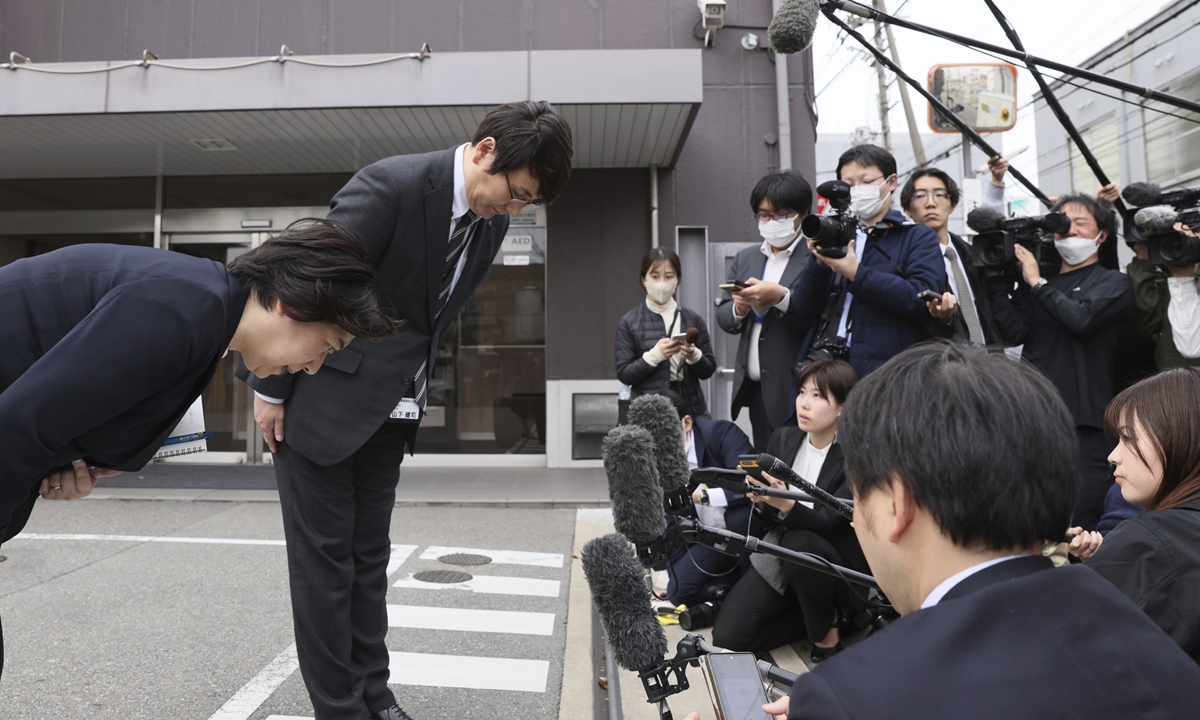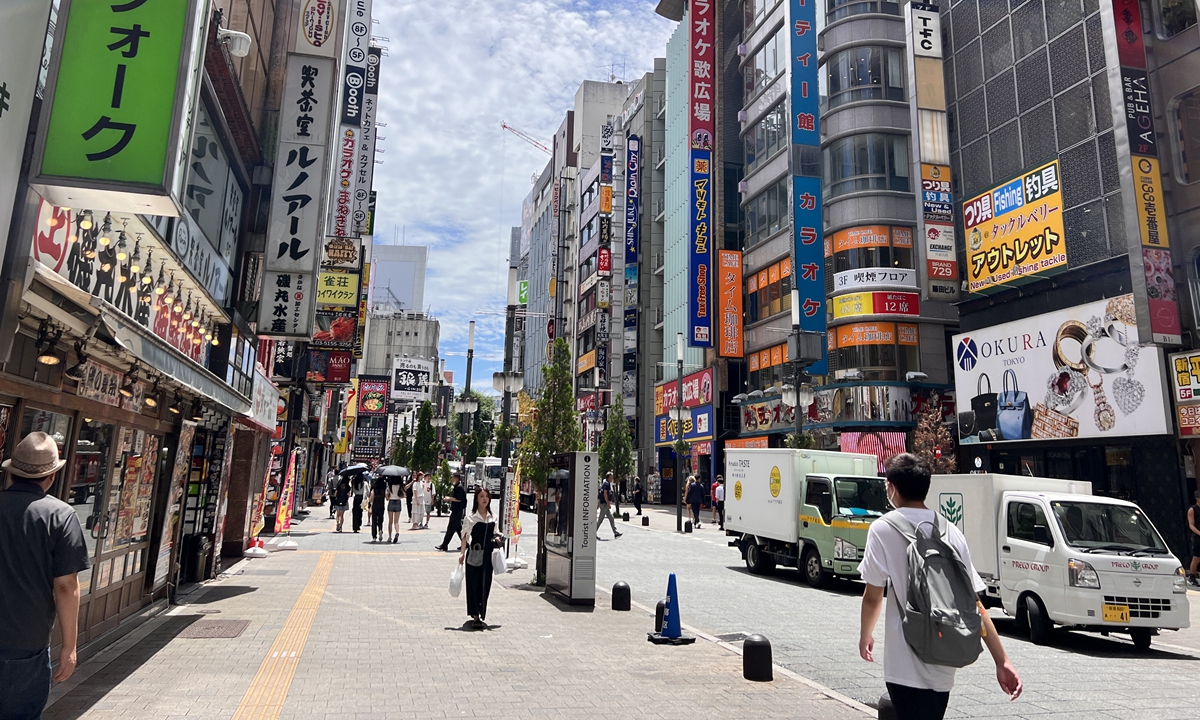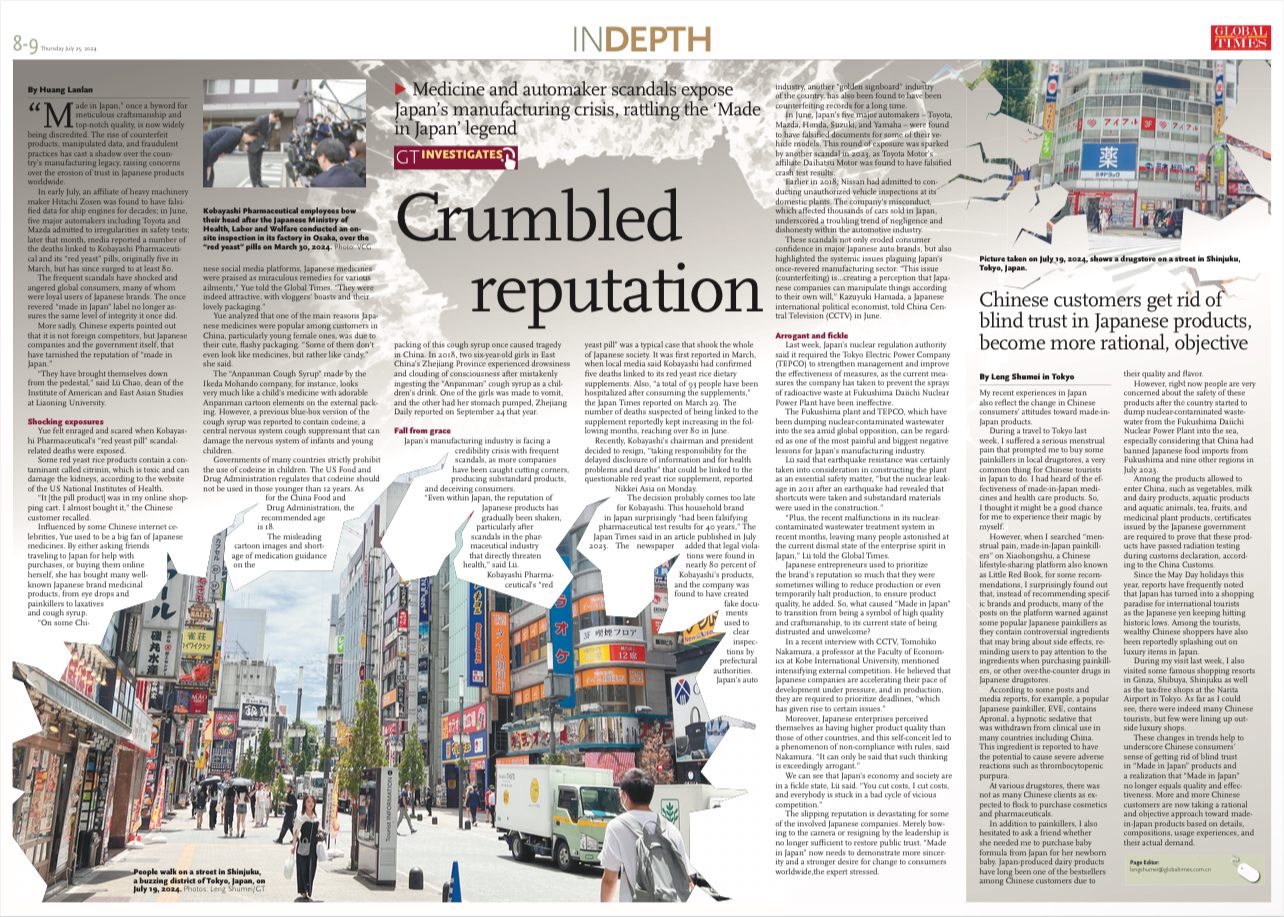
Kobayashi Pharmaceutical employees bow their head after the Japanese Ministry of Health, Labor and Welfare conducted an on-site inspection in its factory in Osaka, over the "red yeast" pills on March 30, 2024. Photo: VCG
"Made in Japan," once a byword for meticulous craftsmanship and top-notch quality, is now widely being discredited. The rise of counterfeit products, manipulated data, and fraudulent practices has cast a shadow over the country's manufacturing legacy, raising concerns over the erosion of trust in Japanese products worldwide.
In early July, an affiliate of heavy machinery maker Hitachi Zosen was found to have falsified data for ship engines for decades; in June, five major automakers including Toyota and Mazda admitted to irregularities in safety tests; later that month, media reported a number of the deaths linked to Kobayashi Pharmaceutical and its "red yeast" pills, originally five in March, but has since surged to at least 80.
The frequent scandals have shocked and angered global consumers, many of whom were loyal users of Japanese brands. The once revered "made in Japan" label no longer assures the same level of integrity it once did.
More sadly, Chinese experts pointed out that it is not foreign competitors, but Japanese companies and the government itself, that have tarnished the reputation of "made in Japan."
"They have brought themselves down from the pedestal," said Lü Chao, dean of the Institute of American and East Asian Studies at Liaoning University.
Shocking exposures
Yue felt enraged and scared when Kobayashi Pharmaceutical's "red yeast pill" scandal-related deaths were exposed.
Some red yeast rice products contain a contaminant called citrinin, which is toxic and can damage the kidneys, according to the website of the US National Institutes of Health.
"It [the pill product] was in my online shopping cart. I almost bought it," the Chinese customer recalled.
Influenced by some Chinese internet celebrities, Yue used to be a big fan of Japanese medicines. By either asking friends traveling to Japan for help with purchases, or buying them online herself, she has bought many well-known Japanese brand medicinal products, from eye drops and painkillers to laxatives and cough syrup.
"On some Chinese social media platforms, Japanese medicines were praised as miraculous remedies for various ailments," Yue told the Global Times. "They were indeed attractive, with vloggers' boasts and their lovely packaging."
Yue analyzed that one of the main reasons Japanese medicines were popular among customers in China, particularly young female ones, was due to their cute, flashy packaging. "Some of them don't even look like medicines, but rather like candy," she said.
The "Anpanman Cough Syrup" made by the Ikeda Mohando company, for instance, looks very much like a child's medicine with adorable Anpanman cartoon elements on the external packing. However, a previous blue-box version of the cough syrup was reported to contain codeine, a central nervous system cough suppressant that can damage the nervous system of infants and young children.
Governments of many countries strictly prohibit the use of codeine in children. The US Food and Drug Administration regulates that codeine should not be used in those younger than 12 years. As for the China Food and Drug Administration, the recommended age is 18.
The misleading cartoon images and shortage of medication guidance on the packing of this cough syrup once caused tragedy in China. In 2018, two six-year-old girls in East China's Zhejiang Province experienced drowsiness and clouding of consciousness after mistakenly ingesting the "Anpanman" cough syrup as a children's drink. One of the girls was made to vomit, and the other had her stomach pumped, Zhejiang Daily reported on September 24 that year.

People walk on a street in Shinjuku, a buzzing district of Tokyo, Japan, on July 19, 2024. Photo: Leng Shumei/GT
Fall from graceJapan's manufacturing industry is facing a credibility crisis with frequent scandals, as more companies have been caught cutting corners, producing substandard products, and deceiving consumers.
"Even within Japan, the reputation of Japanese products has gradually been shaken, particularly after scandals in the pharmaceutical industry that directly threaten health," said Lü.
Kobayashi Pharmaceutical's "red yeast pill" was a typical case that shook the whole of Japanese society. It was first reported in March, when local media said Kobayashi had confirmed five deaths linked to its red yeast rice dietary supplements. Also, "a total of 93 people have been hospitalized after consuming the supplements," the Japan Times reported on March 29. The number of deaths suspected of being linked to the supplement reportedly kept increasing in the following months, reaching over 80 in June.
Recently, Kobayashi's chairman and president decided to resign, "taking responsibility for the delayed disclosure of information and for health problems and deaths" that could be linked to the questionable red yeast rice supplement, reported Nikkei Asia on Monday.
The decision probably comes too late for Kobayashi. This household brand in Japan surprisingly "had been falsifying pharmaceutical test results for 40 years," The Japan Times said in an article published in July 2023. The newspaper added that legal violations were found in nearly 80 percent of Kobayashi's products, and the company was found to have created fake documents used to clear inspections by prefectural authorities.
Japan's auto industry, another "golden signboard" industry of the country, has also been found to have been counterfeiting records for a long time.
In June, Japan's five major automakers - Toyota, Mazda, Honda, Suzuki, and Yamaha - were found to have falsified documents for some of their vehicle models. This round of exposure was sparked by another scandal in 2023, as Toyota Motor's affiliate Daihatsu Motor was found to have falsified crash test results.
Earlier in 2018, Nissan had admitted to conducting unauthorized vehicle inspections at its domestic plants. The company's misconduct, which affected thousands of cars sold in Japan, underscored a troubling trend of negligence and dishonesty within the automotive industry.
These scandals not only eroded consumer confidence in major Japanese auto brands, but also highlighted the systemic issues plaguing Japan's once-revered manufacturing sector. "This issue (counterfeiting) is...creating a perception that Japanese companies can manipulate things according to their own will," Kazuyuki Hamada, a Japanese international political economist, told China Central Television (CCTV) in June.
Arrogant and fickleLast week, Japan's nuclear regulation authority said it required the Tokyo Electric Power Company (TEPCO) to strengthen management and improve the effectiveness of measures, as the current measures the company has taken to prevent the sprays of radioactive waste at Fukushima Daiichi Nuclear Power Plant have been ineffective.
The Fukushima plant and TEPCO, which have been dumping nuclear-contaminated wastewater into the sea while setting aside global opposition, can be regarded as one of the most painful and biggest negative lessons for Japan's manufacturing industry.
Lü said that earthquake resistance was certainly taken into consideration in constructing the plant as an essential safety matter, "but the nuclear leakage in 2011 after an earthquake had revealed that shortcuts were taken and substandard materials were used in the construction."
"Plus, the recent malfunctions in its nuclear-contaminated wastewater treatment system in recent months, leaving many people astonished at the current dismal state of the enterprise spirit in Japan," Lü told the Global Times.
This incident, among many others, has exposed a harsh reality: Japan's tradition of craftsmanship and quality is under threat as more companies prioritize profit over integrity, Chinese experts pointed out.
In Japan, there is a tradition of several generations developing the same brand, and that reputation was once held above all else, said Lü.
Japanese entrepreneurs used to prioritize the brand's reputation so much that they were sometimes willing to reduce production or even temporarily halt production, to ensure product quality, he added.
So, what caused "Made in Japan" to transition from being a symbol of high quality and craftsmanship, to its current state of being distrusted and unwelcome?
In a recent interview with CCTV, Tomohiko Nakamura, a professor at the Faculty of Economics at Kobe International University, mentioned intensifying external competition. He believed that Japanese companies are accelerating their pace of development under pressure, and in production, they are required to prioritize deadlines, "which has given rise to certain issues."
Moreover, Japanese enterprises perceived themselves as having higher product quality than those of other countries, and this self-conceit led to a phenomenon of non-compliance with rules, said Nakamura. "It can only be said that such thinking is exceedingly arrogant."
We can see that Japan's economy and society are in a fickle state, Lü said. "You cut costs, I cut costs, and everybody is stuck in a bad cycle of vicious competition."
The slipping reputation is devastating for some of the involved Japanese companies. Merely bowing to the camera or resigning by the leadership is no longer sufficient to restore public trust. "Made in Japan" now needs to demonstrate more sincerity and a stronger desire for change to consumers worldwide,the expert stressed.

Crumbled reputation






